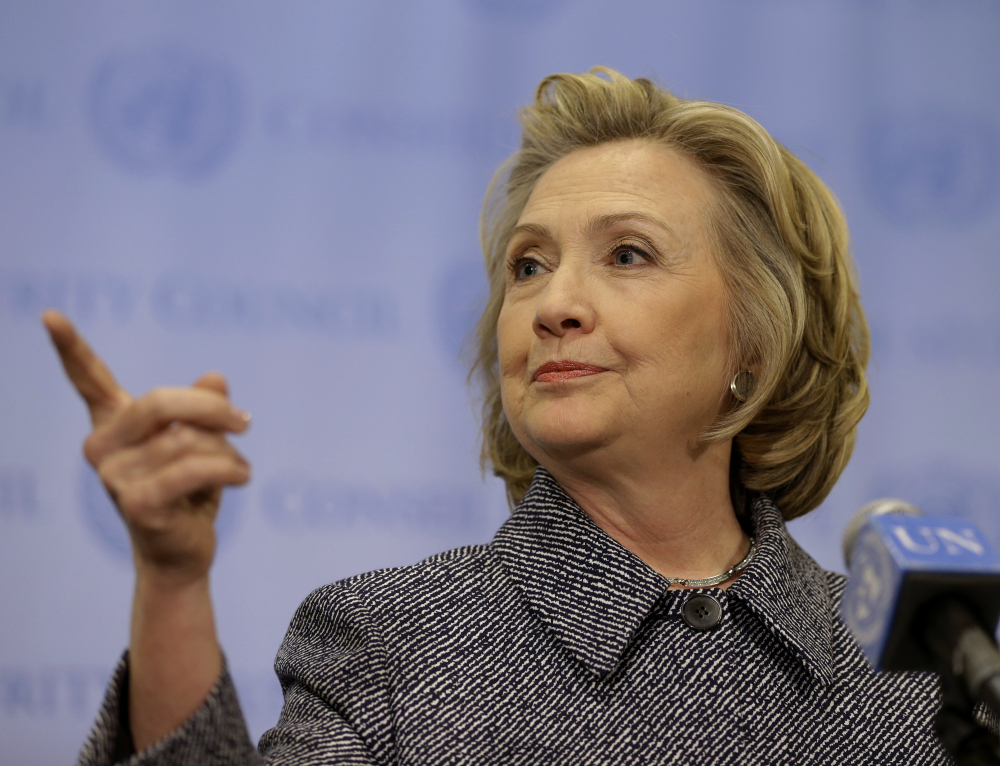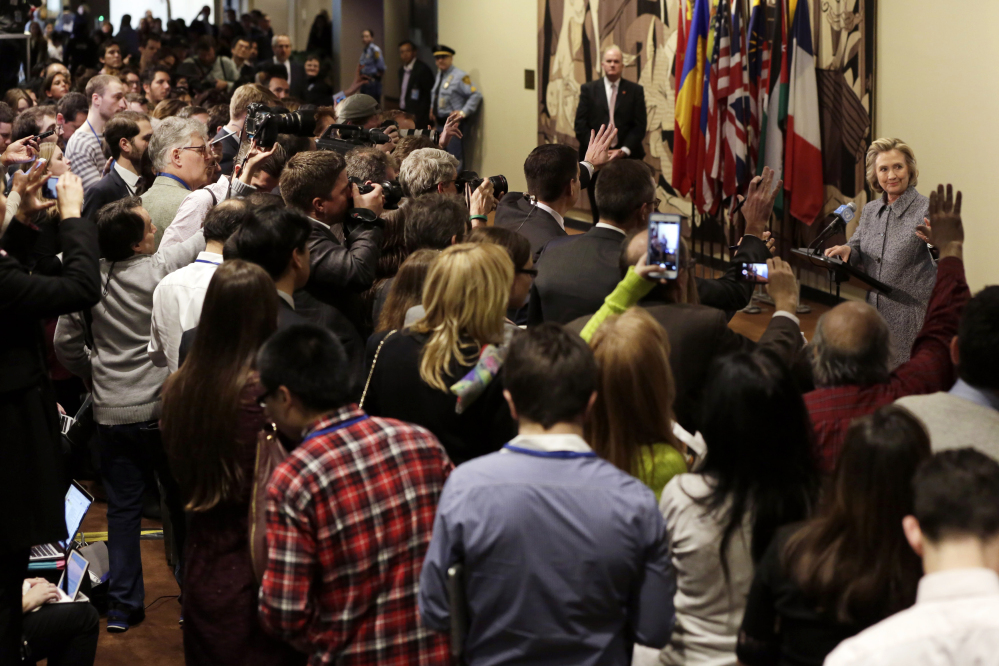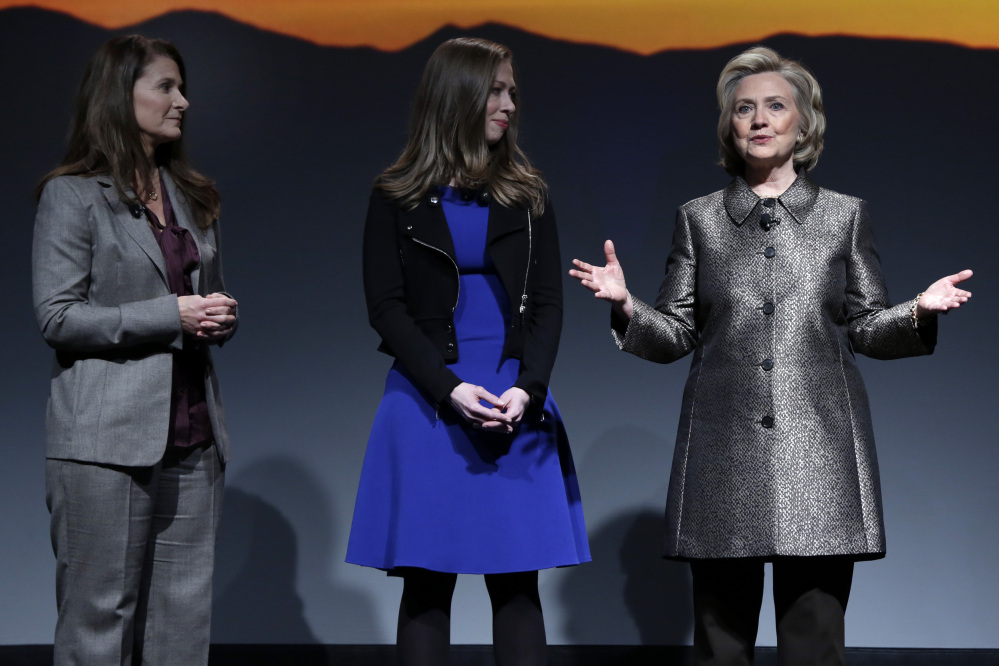UNITED NATIONS — Hillary Rodham Clinton said Tuesday that she regrets using only a private email server for work-related correspondence as secretary of state, saying that she sent more than 60,000 emails from her private account in a four-year span but none contained classified material.
Scrambling to extinguish a growing political controversy before the expected launch of her 2016 presidential campaign in April, Clinton held a hastily arranged news conference at the United Nations headquarters in New York, her first in more than two years. She was lawyerly and measured, but also defiant in insisting that she did not violate any administration rules despite White House guidelines instructing employees to use official email accounts.
Clinton said she exclusively used her private email account out of “convenience,” so as not to have to carry two separate phones. But she conceded that it “might have been smarter” to use a separate government account to conduct her State Department business.
“Looking back, it would have been better for me to use two separate phones and two email accounts,” Clinton said. “I thought using one device would be simpler, and obviously, it hasn’t worked out that way.”
Clinton’s use of a private email server located in her New York home attracted criticism from Republicans and some Democrats about the security of her correspondence, as well as her judgment and penchant for secrecy. Clinton’s office said Tuesday that her use of a private email account was “widely known” by more than 100 U.S. government colleagues with whom she communicated, and that she communicated with only one foreign government official, who was from the United Kingdom.
From March 2009, after she was sworn in as secretary, until her departure in early 2013, Clinton sent 62,320 emails from her private account. Clinton’s office said 31,830 were deemed by her and her attorneys to be personal in nature.
In December, Clinton turned over the remaining emails to the State Department, totaling roughly 55,000 pages in printed form. The department has begun a review of the documents and announced Tuesday that it would release them on a publicly accessible website in coming months.
In her 20-minute news conference, Clinton said she had deleted emails that she believed were “within the scope of my personal privacy” – including, she said, correspondence about daughter Chelsea’s wedding, her mother Dorothy’s funeral, her yoga routines and family vacations.
Clinton defended having made herself the arbiter of which emails to keep for archival purposes and which to delete.
“For any government employee, it is that government employee’s responsibility to determine what’s personal and what’s work-related,” Clinton said. She added, “No one wants their personal emails made public, and I think most people understand that and respect that privacy … I had no reason to save them.”
Rep. Mike Pompeo, R-Kan., a member of the House committee investigating the 2012 terrorist attacks in Benghazi, Libya, called for a “third party” to review the emails.
“It’s just not appropriate for Hillary Clinton to be the final arbiter of what should be turned over,” Pompeo said. “This is truly about getting the facts out for these poor families and the American people.”
Clinton said “there were no security breaches” with her private account, which was connected to a family server at her home in Chappaqua, New York. Clinton’s office would not detail the level of encryption but said that there were “robust protections” and that upgrades were employed over time.
“I did not email any classified material to anyone on my email,” Clinton said. She added, “I fully complied with every rule that I was governed by.”
In the wake of the revelation March 2 that she had conducted State Department business over private email, Clinton tried to remain above the fray. She tweeted that she wanted the public to see her email, but she refused to comment on the matter in her public appearances and waved off reporters’ questions Monday.
But after pressure mounted, including from Democratic allies, for her to respond more aggressively, Clinton was compelled to shift strategy and hold a news conference – her first in more than two years.
Sens. Dianne Feinstein, D-Calif., and Richard Durbin, D-Ill., called on Clinton to personally address her email practices. President Obama also did not come to Clinton’s defense in an interview over the weekend, while his White House tried to distance itself from the controversy by stating that Clinton did not follow administration guidelines against using private or commercial email for government business.
Privately, senior Democrats have been wringing their hands at what they consider a botched response by Clinton and her skeletal political operation, fearing that her silence fed suspicions that she had something to hide.
The email controversy overshadowed two days of carefully choreographed events aimed at celebrating Clinton’s lifelong commitment to empowering women and girls. The events are part of the thematic buildup to the expected launch of her official campaign.
At the Women’s Empowerment Principles event at the U.N. earlier Tuesday, Clinton was warmly welcomed as a “future president.”
But elsewhere in the U.N.’s hulking headquarters, the scene was chaotic before her news conference. Scores of journalists and a massive scrum of television cameras waited hours in line to get credentials to access the high-security compound. At a stakeout location, a simple podium was set up for Clinton only a few feet away from a copy of Picasso’s “Guernica,” which gruesomely depicts the suffering of innocent civilians under fascism during the Spanish Civil War.
Although her smile was tight-lipped at times, Clinton mostly appeared at ease, if slightly exasperated. Hewing closely to her written talking points, she made no obvious blunders.
Still, Republicans showed no signs of letting up their scrutiny, and they focused in particular on her deletion of emails she considered personal.
Republican National Committee Chairman Reince Priebus said in a statement that Clinton was “disingenuous” in her news conference.
“If she had an ounce of respect for the American people, she would have apologized for putting our national security at risk for ‘convenience,’ ” Priebus said in a statement. “She would’ve agreed to hand over her secret server to an independent arbiter. . . . She did none of that.”
Rep. Trey Gowdy, R-S.C., who chairs the House Benghazi committee, said Clinton’s news conference left “more questions than answers” and that he would call her to appear before his committee at least twice.
“Without access to Secretary Clinton’s personal server, there is no way for the State Department to know it has acquired all documents that should be made public,” Gowdy said in a statement. He added that there remain “serious questions about the security of the system she employed from a national security standpoint.”
The Clinton email revelations have given new life to Gowdy’s probe into the Benghazi attacks that left four U.S. officials dead. Although a trove of Clinton’s emails was turned over to the committee months ago, Gowdy has alleged that she must be hiding more related to Libya and vowed to issue subpoenas.
The State Department’s Accountability Review Board, which investigated the Benghazi attacks, said following the release of its report in late 2012 that it had been given “unfettered access to everyone and everything, included all the documentation we needed.”
The board asked for all pertinent information, including emails, Thomas Pickering, the former senior diplomat who led the inquiry, said in an interview Tuesday. “I have no recollection of seeing any Hillary Clinton emails,” he said.
Pickering said he recalled no emails at all in the documents reviewed by the board, although he “could not say categorically” that there were none. “We could have received some” from other State Department officials that were examined by staffers, he said, “but I don’t recall any from the secretary.”
The controversy has tested Clinton’s strategy of remaining on the sidelines of the official 2016 presidential contest for as long as possible. As the undisputed front-runner for the Democratic nomination and without a serious opponent, she has had the luxury of picking which issues to address while keeping most details of her forthcoming campaign secret.
Several likely GOP presidential contenders, including former Florida Gov. Jeb Bush, have sharply criticized her handling of the emails issue.
Asked what impact the controversy may have on the timing of a possible campaign announcement, Clinton said, “With respect to any sort of future issues, I trust the American people to make their decisions about political and public matters.”
“I feel that I’ve taken unprecedented steps to provide these work-related emails,” she continued. “They’re going to be in the public domain. And I think that Americans will find that, you know, interesting, and I look forward to having a discussion about that.”
Send questions/comments to the editors.





Success. Please wait for the page to reload. If the page does not reload within 5 seconds, please refresh the page.
Enter your email and password to access comments.
Hi, to comment on stories you must . This profile is in addition to your subscription and website login.
Already have a commenting profile? .
Invalid username/password.
Please check your email to confirm and complete your registration.
Only subscribers are eligible to post comments. Please subscribe or login first for digital access. Here’s why.
Use the form below to reset your password. When you've submitted your account email, we will send an email with a reset code.